Translations 677
Hawks and Doves in the US Since Covid-19
Hawks and Doves in the US Since Covid-19

By Manuel E. Yepe
http://manuelyepe.wordpress.com/Exclusive for the daily POR ESTO! of Merida, Mexico.
April 15, 2020
Translated and edited by Walter Lippmann.
Finding the right balance between public security and personal freedom after COVID-19 “will require a review of everything we in the United States say we need to do in the interest of our security, which should involve moving away from militarized approaches to global problems to many other instruments of American power and influence.
This is what Christopher A. Preble, Vice-President of the CATO Institute for Defense and Foreign Policy in Washington DC, reflects in an article published in the magazine “Responsible Statecraft”, on the possible implications of the COVID-19 outbreak on the future of US foreign policy.
Among the responsibilities of many U.S. government officials is the identification of national security threats and prioritizing, among many options, the appropriate tools to address them.
Those who advocate increases in Pentagon spending – the so-called hawks in the language of the day – are likely to argue that resources should not be cut to the military to free up more resources for public health.
“We will soon be back to normal,” they will say from their perspective, “it would not be wise to redirect our national security strategy and spending to address one particular type of threat, at the expense of all others.
This is not exactly how politics responded after 9/11, but, in that case, the military eventually emerged victorious. In fact, anyone who opposed the militarized approach (that of the doves, who see the fight against terrorism as primarily an intelligence and law enforcement problem) was attacked by the hawks for not taking the threat seriously enough.
“Only a war would be enough; anything else would be naive, or even insensitive: a sign of indifference to the inevitable suffering of future victims of terrorist attacks.
That perspective, set a few days or weeks after 11 September 2001, has persisted. Even today, proposals to withdraw US forces from Afghanistan, for example, are met with serious warnings that this will increase the risk of future terrorist incidents in the United States. We are told that “only a continued, indefinite US military presence can manage this risk and the best we can do is to manage that danger.
Will such arguments survive the current crisis here at home? What politician will argue that Americans would have to die from COVID-19 today to ensure that other Americans are not killed by a terrorist in the future? And, will it be true that such military personnel so willing to “help” other countries are necessary to save our own?
The suggestion seemed absurd for generations, because the danger was not near, not even on the horizon. Now, it’s here.
If before it was considered naive to doubt that terrorism would represent a very serious threat to public security in the future, and skeptics were considered dangerously out of touch with reality, then the suggestion was not accepted,
Will the claims of the traditional defense hawks now come under greater scrutiny, without any senator or representative asking, for example, how that ship, tank or missile might function against a deadly pandemic?
In the post-September 11 era, a few dared to question whether the enormous expenses we had incurred amounted to unnecessary overreaction. But most Americans literally fell into that line.
The disease and its aftermath should provoke strong debate about how to preserve America’s national security.
In a peculiar twist, those who call for more spending to defeat the diseases could be called the hawks of the pandemic, while those who argue against it (and prefer that most resources stay in the military) become the doves.
The suggestion might seem odd, and the terms hawk and pigeon belong to more than just spending priorities. Because, even if the coronavirus didn’t change everything, it would necessarily change many things.
The senior leader of the Washington DC-based CATO Institute for Defense and Foreign Policy concludes that “finding the right balance between public security and personal freedom after COVID-19 will require Americans to review all the things we have to do to keep ourselves safe and to move away from a militarized approach to global problems.
Public Transportation Makes Adjustments


Public Transport Switches to
Direct Service for Essential Workers
In view of the logical concerns and worries in the population, caused by the paralysis of public transport in the country, Eduardo Rodriguez Davila, Minister of Transport (Mitrans), stressed the importance of understanding, support and discipline towards these provisions, in view of the progress of the new coronavirus
Author: Susana Antón | susana@granma.cu
April 13, 2020 21:04:09
Translated and edited by Merriam Ansara.
Edited by Walter Lippmann for CubaNews.
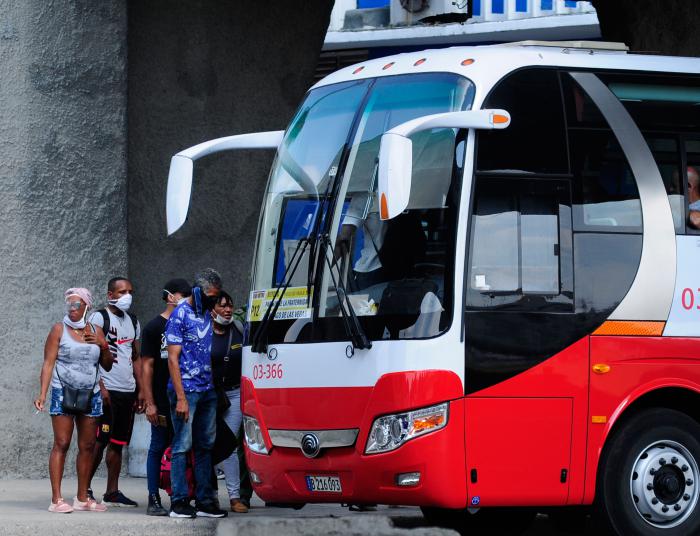
The new measures in transport seek to prevent the spread of VOC-19. Photo: Endrys Correa Vaillant
Responding to the logical questions and concern of the population over the suspension of public transportation in the country, the Minister of Transport, Eduardo Rodriuez Davila, remarked how important it is for people to understand, support and uphold these measures as necessary in the face of advancing COVID-19.
He explained to Granma, that the suspension does not for the moment include state vehicles that are used to ensure the functioning of the economy, nor privately owned personal vehicles which can circulate as needed, so long as they also are not creating traffic jams.
There is still also the movement of cargo, he said, as necessary to support the economy.
He confirmed that the mandatory suspension imposed Saturday, April 11, includes all public transportation both urban and inter-urban, includes both state and privately owned, and includes the support services for state vehicles.
Instead, transportation services have been organized for workers in the medical and health centers, commerce -related services, policing services and others defined by the Defense Councils (Civil Defense) throughout the country as essential activities.
He added that these are for specific workers at specific hours so that they can go and return from their places of work.
He said also that transportation has been guaranteed for all dialysis patients, people undergoing cancer treatments and in other situations of medical urgency. Information telephone lines have been set up at the main health centers in each municipality.
For these services as well, transportation reinforcements have been provided to all of the local defense councils, including ambulances and medi-buses.
He said that all transportation drivers concerned about the situation of their salaries should check with their own work centers which have been put in charge of administering the benefit directives of the Ministry of Labor and Social Security.
In terms of self-employed transporattion workers, Rodriguez Davila said that the current suspension of service applies for the moment to passenger and cargo transportation (including bici-taxis and buggies), and services related to these such as driving instructors and taxi stand managers.
The suspension applies to the operation of vehicles and does not include suspension of related activities such as vehicle repair, bodywork, or tire repair. These can continue so long as it does not lead to any gatherings of multiple individuals and that those involved observe the prescribed infection protection measures.
He said that for any further clarification or needs, workers in these services should direct themselves to the offices from which they have received their licenses.
The MINTRANS minister said he realized that there have had to be huge adjustments from the public transportation of passengers to transportation for designated workers.
All of these newly adjusted services have had to be carried out with strict adherence to measures of zero crowding, everyone wearing facemask, ensuring use of hypochlorite for hands before boarding and complete disinfection of the vehicles after each run.
Each day there will need to be adjustments to improve the new services and to avoid any adverse effects to essential services. He said that instructions had been given to all of the provinces to improve organization of the routes, schedule frequency and other elements that would ensure maximum efficiency of service and conservation of fuel.
He said that MINTRANS was also working with all of the main entities of the central government administration, the defense councils and the state enterprises involved in operation of port-to -transportation to economic distribution so as to guarantee timely distribution of the family ration basket of regular guaranteed goods and other measures to ensure the delivery of food and other basic products to the community.
He remarked that yesterday, Monday, because of the possibity of propagaiion of COVID-19, the Business Group for Automotive Transport Services had decided to close the Schools for Road and Driving Education to avoid gatherings of multiple individuals and had issued an announcement to this effect.
He announced that the deadlines for certificates, license renewals and psychological/physical driver exams for those whose documents were expiring had been extended until services were restarted in the related centers and offices.
Anyone who had already paid for the service at the time of the service suspension, who didn’t wish to continue the service could ask for 100% reimbursement of the amount paid.
Cuban Media in Battle vs. COVID-19
Media Near the Front Lines of the Battle Against COVID-19
by Yaymara Villaverde Marcé // Cuban News Agency
Translated and edited by Walter Lippmann for CubaNews
Guantanamo, 11 abr (ACN) After the heroic medical army, today on the first front of battle against COVID-19, there is also a commendable rear guard of professionals and essential workers, food producers, dependents, carriers, and journalists, recorder or camera in hand always present in times of contingency.
Every profession entails sacrifice, yes, and communicating in times of global health crisis a risk quota, a reality that challenges media institutions to unleash all the reporting and creative capacity of their journalists. They have reorganized their routines to ensure the safety of the guild and the time to inform the population in a timely and transparent manner.
We have that responsibility to our people and humanity-as Taimi Fernández, president of glove journalists, tells it, this is our duty to avoid misinformation. More so in this difficult context where accurate guidance is needed, from reliable and scientific sources, to raise public perceptions of risk and encouraging preventive behavior.
Information is a vital tool, a way to fight the new coronavirus and its spread-points out. The responsible press must take advantage of the influence that the media exert on the collective consciousness, with reliable and contrastable data that cut the wings to rumors and false news that only generate confusion and hinder an effective response.
Consequent with the decisive measure of social isolation and confinement, the Cuban media has redesigned its daily dynamics, strengthened the teleworking modality to reduce the influx of professionals and technicians, and have exempted those with chronic suffering from risks which make them vulnerable in this epidemic scenario.
This is how Mabel Pozo, director of the radio station CMKS Guantanamera, where today the necessary health and protection measures are taken. She works with the essential staff, programming was adapted to the context shee points ou, and this and the views of the people are monitored by specialists, depending on which deliveries move.
Similar strategies assume reporters and technicians of the newspaper and provincial television. There, several take advantage of remote work, in an informative reality in which mobile journalism intensifies, taking advantage of the potential of smartphones and basic technologies to generate content and products communicative for online platforms.
Lisván Lescaille, in front of Telecentro Solvisión, tells us that his medium reduced active staff-as a first step to protect vulnerable groups – adjusted the billboard by prioritizing three information magazines with the theme COVID-19 and invited experts, and working groups were created both on the streets and from homes, through social media.
Ariel Soler, Head of Information of the weekly “Venceremos”, spoke of vital hypermedial work in this context spoke about the journalistic exercise in which their reporters are inserted, six with corporate mobile phones and others with the Internet in their homes, with whom the editorial board of the journal organizes the work by phone, giving special follow-up to the epidemiological situation.
And nothing more revealing than the opinion of the people regarding this work, like that of the septuagenarian Guantanamera Dalia Aguilar, of those sharp to which no one makes a story, who told the ACN that no report from the national press is lost and local, “because warfare well warned does not kill soldier”, and thanks the professionals in that sector for their credibility.
Last March Ricardo Ronquillo, President of the Union of Journalists of Cuba (UPEC), sent recognition to the professionals of the country’s public media system, for the extraordinary informative work in the confrontation of the global pandemic, urged to join this campaign to all communication platforms, and take institutional measures to protect the guild.
Journalists are close to the first line of battle against the disease, because they have to report what is happening around it in Cuba, so it is important to the media to ensure its protection, he stressed.
These are times to act quickly and informative transparency said Ronquillo in a meeting of the expanded presidency of the organization and emphasized-” UPEC is not demobilized, on the contrary, we must now unleash all the creative capacity to make visible to public opinion, national and international, the work of the media”.




The Coronavirus and the Crusade Against 5G

The Coronavirus and the Crusade Against 5G
Unique UK fires fuelled by conspiracy theories highlight the importance of fact-checking and maintaining common sense in the face of the SARS-CoV-2 pandemic
 By Yurisander Guevara
By Yurisander Guevara
guevara@juventudrebelde.cu
April 8, 2020
Translated and edited by Walter Lippmann for CubaNews.
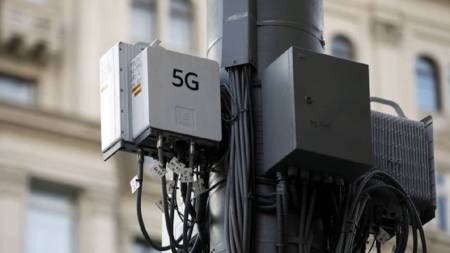
There is no scientific evidence linking 5G to COVID-19 Author: The Verge Published: 08/04/2020 | 08:49 pm
Conspiracy theories are generally harmless phenomena that rely on circumstantial issues to generate questions that often go unanswered. Thus, they sow doubt about a topic and generate debates that, in this age of the Internet everywhere, become endless.
However, when one of these theories causes consequences in the social fabric, it can already be described as dangerous. This is what is happening right now in the United Kingdom, where several telephone poles with 5G transmitters have been burned in some cities. These facts that are linked to an evil rumor that is spreading like wildfire in the networks, taking advantage of the social hysteria generated by SARS-CoV-2.
According to the “conspirators”, the deployment of the fifth generation of mobile data transmission technology, or 5G, is linked to the COVID-19 pandemic, which has led to the burning of transmitters, a sign of the panic caused by the epidemic.
Theories
Rumors and conspiracy theories about a link between the launch of 5G and the spread of the coronavirus have spread mainly through social networks. There are groups on Facebook and Nextdoor, where thousands of members repeat false and misleading claims that 5G is supposedly harmful.
The theory claims that the new coronavirus originated in Wuhan because the Chinese city had recently launched 5G. Supposedly it has now spread to other cities that also use this technology.
It is the hottest hoax on social networks these days, after another one was dismantled, claiming that the SARS-CoV-2 virus was created for obscure geopolitical purposes. In this last case, the theory falls apart with a study entitled The Proximal Origin of the Coronavirus, published in the journal Nature Medicine.
Research compares the ribonucleic acid sequence of this microorganism with that of other coronaviruses such as SARS and MERS, and bases its conclusions on the characteristics of a protein called spike. This spike is found in the external envelope of the virus and has a sort of hook through which it attaches to human cells. This “ability” of the pathogen is essential in its ability to infect people, one of its most damaging characteristics.
And it is so perfect, according to the study, that “it is most likely the product of natural selection (…) strong evidence that SARS-CoV-2 is not the product of self-serving manipulation”. In the same sense, and even more categorically, researcher Kristian Andersen, from Scripps Research Institute, in Florida, United States, stated in La Repubblica, an Italian publication: “Confronting the generic data available today on the various types of coronavirus, we can resolutely state that SARS-CoV-2 is the result of natural processes”.
In the case of the theory linking 5G to the new coronavirus, there is no more than investigating the properties of this new technology, so-called because it is the fifth generation of mobile phone networks, designed to multiply the connection speed of our portable devices tenfold.
Those who defend the theory claim that 5G weakens the immune system, emitting harmful radiation and therefore facilitating the entry of the coronavirus into the body. They also add that viruses use radio waves to communicate.
The first “argument” collapses when we look at the radio spectrum. At the low-frequency end of the spectrum, we find the radio waves used by 5G. Therefore, this technology does not produce ionizing radiation and does not damage human DNA, which other frequencies such as X-rays or ultraviolet light, responsible for causing diseases such as cancer, do.
According to the AS newspaper, “radiation emitted by radio waves is at a similar level to that produced by televisions and natural light. It is true that this new generation is a bit above its predecessors in this type of emissions. It is also true that, according to Ofcom – the UK’s telecommunications regulator – the maximum it can generate is 66 times below the safety limit.
The Department of Health in England adds that 5G “should have no impact on public health” and the World Health Organization has included 5G under heading 2B of carcinogens. That is, among those not proven to be capable of producing cancer. According to this classification, it would be as potentially carcinogenic as coffee.
The second argument is pure fantasy, while there are no studies that point in that direction. There are, however, that admit that this communication through radio waves could occur between bacteria (in no case between different viruses). For example, there is a study by a group led by Allan Widom at Northeastern University in Boston, USA, whose conclusions have been discussed by the prestigious Massachusetts Institute of Technology.
The facts
Despite all the evidence that disproves this crude conspiracy theory linking 5G to SARS-CoV-2, UK territories such as Birmingham, Liverpool and Melling have been the scene of cell tower fires in recent days.
The UK’s Department for Digital, Culture, Media and Sport tweeted that “there is absolutely no credible evidence” of a link to the conspiracy theory, while commercial agency Mobile UK said such rumours and conspiracy theories were “worrying”.
UK telecoms operators now believe the attacks undermine the nation’s security. According to a tweet from Vodafone’s chief executive officer there, “this is now a matter of national security. The police and anti-terrorist authorities are investigating.
There have even been reports of harassment of telecommunications workers as they deployed fibre optic cables, as witnessed by a video also broadcast on Twitter by a BBC reporter.
The truth is that Iran, for example, is among the nations most affected by the new coronavirus, and there is not a single 5G tower there. There’s lots of evidence that dismantle this misleading theory, but the emotional fragility begins to make a dent. 5G is not a factor in its spread. Globalization is. And once the virus enters a territory, social isolation is the most effective measure to prevent its spread.
For our readers, who today are contributing to the great global battle against SARS-CoV-2 by staying at home, here is some advice: follow only official information from authorities about the pandemic and do not contribute to the networks that expand the reach of false news. We already see how harmful and dangerous it can be to feed on unverified facts, especially when the situation we are living in requires poise and a lot of common sense.
A Frenchman Who Saw the Sun Again

The Frenchman Who Saw the Sun Again in the Isolation Center in Matanzas
This white-bearded man conveys with his clear eyes the immense gratitude that neither resources nor tiredness nor sleep were spared in order to save him
 By Hugo Garcia digital@juventudrebelde.cu
By Hugo Garcia digital@juventudrebelde.cu
April 9, 2020
Translated and edited by Walter Lippmann for CubaNews.
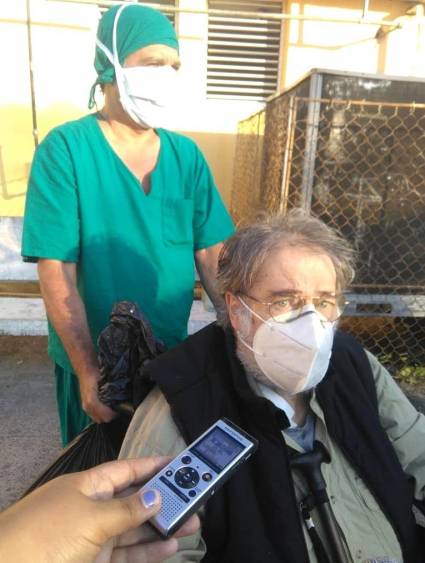
Jack Gaetan Joseph Villiers, Discharged Patient Author: Jessica Rufin Posted: 09/04/2020 | 07:36 pm
Jack Gaetan Joseph Villiers is a Frenchman who is miraculously alive. It’s as simple as that. But the miracle has also come about because of the proven professionalism of Cuban health.
“This is the first time I’ve seen the blue of the sky after almost 20 days of admission,” he said in a choppy voice from the wheelchair in which he was being transferred to the ambulance that would take him to Havana.
This man with a graying beard conveys with his clear eyes the immense gratitude that no resources, no tiredness, no sleep were spared to save him.
“But I feel good already. When all this is over, we will return to Cuba,” he whispered in his deficient Spanish as he said goodbye to the bus at the Mario Muñoz Monroy Hospital’s isolation center, becoming the sixth confirmed positive patient of the COVID-19 to be discharged in this city.
“Now I can confirm what my brother, who is a doctor, said about the capacity of Cuban doctors, who have specialized in fighting pandemics and diseases like these,” the Frenchman stressed to the Matanzas television and radio media.
Dr. Juan Carlos Martin Tirado, director of the hospital, confirms that this is another achievement of Cuban medicine, because this patient had many of the expected complications at his 72 years of age, including heart disease, hypertension and a major underlying diabetes mellitus.
Martín Tirado praised the delivery of the multidisciplinary team of intensive care, which worked day and night to save the patient.
Brave Ones: Revealing Faces, Beatriz

BRAVE ONES: Revealing Faces, Beatriz Rodríguez
April 12, 2020
Translated and edited by Walter Lippmann for CubaNews.
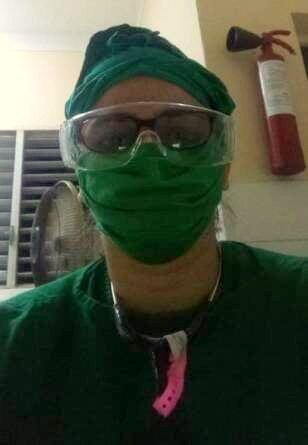
Beatriz Rodriguez Sandeliz is 30 years old. She is a First Grade Specialist in Pediatrics and head of the Respiratory Service of the Children’s Hospital “José Luis Miranda”, in Santa Clara, Villa Clara. Dr. Beatriz formed, in the beginning, together with Dr. Marbin Machado Díaz, also from the Children’s Hospital and Drs. Lissy Pérez Leal and Richard Godoy León, from the “Manuel Fajardo” Military Hospital, the team of eight pediatricians who, at present, attend to infants who are contacts, suspects or infected with the SARS-CoV-2 coronavirus.
“If they knew how hard it is to see a 12-year-old girl crying because her PCR has tested positive, we wouldn’t be so irresponsible and would stay home. It hurts to see a helpless child cry because we have not been consistent and have failed to protect those who are the hope of the world,” says this young doctor with only six years of training, three of them as a pediatrician.
(Texts and photos by Yudith María Delgado Rodríguez and Félix Alexis Correa Álvarez)

Trump and Covid-19

Trump, an Egomaniacal Monster, and Covid-19
WHO Director-General Tedros has been clear about attitudes like those of Trump and others: “Quarantine policy…”, at the WHO “no policy is made”, its mission is “to care for the poor and vulnerable”
By Juana Carrasco Martín
April 9, 2020
Translated and edited by Walter Lippmann for CubaNews.
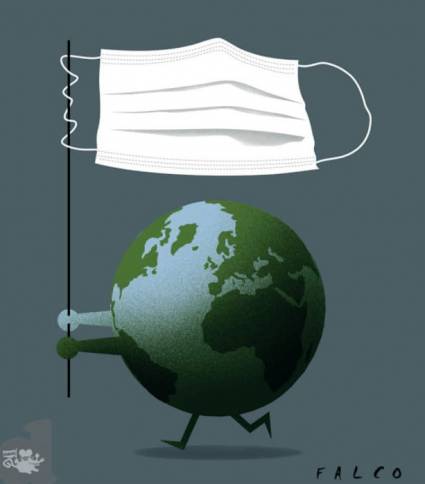
While Trump tries to discredit the World Health Organization, the world is still struggling Author: Falco Posted: 09/04/2020 | 04:32 pm
He’s definitely not crazy, he’s a shameless, cynical bastard. A criminal of the same ilk as Hitler. A being unworthy of belonging to the human species. Every day he does or says an atrocity or various monstrosities. Of course, I am referring to Donald Trump, the powerful president of the United States, which is why he tells us so much about what he says or does.
This Tuesday, April 7, when the world counted 78,269 deaths and at least 1,381,014 people infected with Covid-19, figures that continue to grow by the minute, Trump announced that he will suspend the U.S. contribution to the World Health Organization (WHO).
An hour before this mention at his daily press conference at the White House – not before he had given a rapid test of the virus to everyone in the vicinity of the president and vice president Mike Pence, especially reporters – Trump had exposed on his personal Twitter account that the World Health Organization (WHO) was too focused on China and had given – in his opinion – wrong advice during the outbreak of the new coronavirus.
The campaign to discredit the World Health Organization coincides with a revelation by the WHO’s director-general, Ethiopian microbiologist Tedros Adhanom Ghebreyesus, who said that in the past three months, during which his organization has led the global fight against the coronavirus, it has received threats of death and attacks of various kinds, including racist ones.
“I’ve been getting personal attacks for three months, some of them racist, and to be honest I’m proud of my color. I have even received death threats, but I don’t care at all. Why would I care about being attacked if people are dying, we are losing lives every minute,” he said.
“When it’s personal I don’t care, I’m no better than anyone else, but when an entire community is insulted, then that’s it, I can’t tolerate that,” he said in a calm tone.
Tedros has been clear about attitudes like those of Trump and others: “Quarantine politics…”, at the WHO “you don’t make politics”, its mission is “to care for the poor and vulnerable” in these times when the whole world is embroiled in the crisis caused by the coronavirus.
This was the motivation of the American president, when the Director of the WHO rejected the racism of “scientists” who propose to use Africa as a laboratory for criminal experiments on the population. This would have been under the pretext of looking for a Covid-19 vaccine, Trump decided to punish the WHO. Venezuelan diplomat Samuel Moncada, commented on Twitter: “It is colonialism at war with the world”.
But Trump’s actions are not limited to looking to the WHO as a scapegoat for his own mistakes in handling the crisis, which he long ignored, but he had even denied the terrible importance of the disease.
If we are particularly affected and hurt by the application of the laws of the blockade to prevent a Chinese donation to Cuba from reaching the Greater Antilles, it must be pointed out that it acted with equal dishonesty and lack of ethics towards its allies. For example, Canadian Prime Minister Justin Trudeau has pointed out that he is still working to persuade Washington to lift the blockade on a shipment of half a million masks that should have arrived in Ontario on Wednesday.
The lord of the White House does not lose his ways, and when the world needs love, courage, compassion, generosity and commitment to the truth of what is happening, Donald Trump continues to set deadly traps.
Neighborhood Heroines

photo reporting
Neighborhood Heroines (+ videos)
The woman, as always, where they are most needed. The work is enriched by the fruit of her labor
Author: Juvenal Balán Neyra : juvenal@granma.cu
April 6, 2020 18:04:25
Translated and edited by Walter Lippmann for CubaNews.
In the Naroca neighborhood, Boyeros municipality, the dynamics of the current moments of confrontation with the COVID-19, has changed the coming and going of neighbors, the children’s games in the surroundings of the buildings, although some essential services for the population remain vital.
In the apartments the sewing machines are kept in constant movement. Women of all ages spend much of their precious time in front of them. The legs are exercised with the pedal. The eyes are fixed on the passage of the fabric, through the needle, which at a dizzying pace is shaping the nasobuco. Others tidy up and finish them off. In short, there is motivation to create and contribute. It’s time to do.
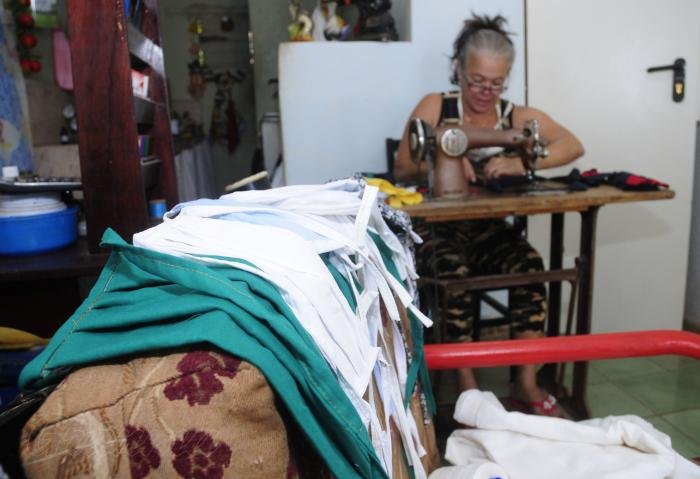
Photos and videos here:
http://www.granma.cu/fotorreportajes/2020-04-06/heroinas-del-barrio-06-04-2020-18-04-25
VENEZUELA: Most Recent Keys
- English
- Español
VENEZUELA: Most Recent Keys
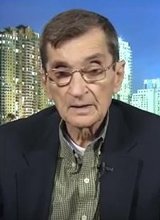 By Domingo Amuchastegui.
By Domingo Amuchastegui.
Received by email, April 7, 2020
Translated and edited by Walter Lippmann for CubaNews.
The Venezuelan crisis is back on the daily foreign policy menu of the Trump administration. It seems incredible that Washington gives time and resources to the Venezuelan scenario when it is overwhelmed by the other crisis, the world-wide crisis of the coronavirus, where in the United States tens of thousands are infected and hundreds die every week, with 6.6 million unemployed and a recession that is on its way to overcome by far the Great Depression of 1929.
Let’s look at the facts. At the beginning of the year, Secretary of State Pompeo and President Trump’s personal lawyer Giuliani threatened the governments of Havana and Caracas with intimidating pressure, having as their main objective the resignation of the Maduro government. Maduro acknowledged that such pressure had been exerted and strongly rejected. Cuban President Díaz-Canel made it clear to a group of foreign correspondents who accompanied him on his inspection visit to Sancti-Spíritus province that he rejected this last-minute maneuver on the part of the U.S. government.
Shortly afterwards, a CARICOM conference was held in Kingston, Jamaica, with the attendance of very few members -less than half of its membership- of this group, to which American foreign policy usually attached very little importance, always sending junior officials. But the latter was attended by no less than Pompeo himself, seeking to gain support from those attending for his plans to maneuver against Venezuela and Cuba. He did not find any echo or official support from the governments present there.
Persisting in such designs, in the recently concluded month of March, two initiatives appear in US foreign policy towards the Venezuelan crisis that seem to contradict each other. They have unusual levels of inconsistencies in both and both supported by a surprising deployment of US naval air forces in the vicinity of Venezuela’s territorial waters, The latter is fuelled by the wishes and prognoses of many in Washington and Miami that this could be the prelude to the application of some variant that derives from the precedent of the invasion of Panama.
The two initiatives to which I refer are:
a. The well-known sanctioning of Maduro and other important leaders of the Venezuelan Government by the American authorities, who have put prices in the millions on their heads, in the best style of Hollywood westerns. In a truly threatening tone, its similarity to the case of Panama (Noriega) in 1989 seemed to suggest a much more confrontational and aggressive course of action after more than a year of failures trying to bring about, through various tactics, the overthrow of Maduro’s government.
b. And suddenly, barely two weeks later, the Secretary of State, Pompeo, announces another formula, this one diametrically opposed to the first one because of its apparent political-diplomatic flavor. In this formula, Maduro and Guaidó are asked to resign from their posts and deposit their positions and functions in the hands of a council of state composed of five members elected by the National Assembly, which would govern for one year and prepare a general election accepted by all.
Remarkably interesting is the fact that the proposal does not exclude Maduro or Guaidó from appearing as future presidential candidates. This proposal by Pompeo makes no mention of Maduro’s being prosecuted for drug trafficking, as if it did not exist, nor does it establish any link between the former and the latter. In exchange, the US would proceed to “soften” or reduce the enormous burden of economic and legal sanctions imposed by Washington on the Caracas government. Both political figures -Maduro and Guaidó- have rejected such a settlement offer.
Then the unbelievable happens: at the beginning of April, the deployment of US air naval forces very close to Venezuela’s territorial waters is announced under the alleged argument of intercepting and counteracting the alleged drug trafficking originating from Caracas to the US. This deployment of military forces by the United States seems to operate in a direction contrary to that of a political-diplomatic arrangement such as the one formulated at the end of March.
It is perfectly legitimate to ask: is this a return to the Panama precedent or a calculated exercise of greater pressure leading Maduro and Guaidó to accept the transition proposal (Democratic Transition Framework, as it has been called) or, failing that, to influence by this means, once again, the Venezuelan military in favor of a Bonapartist/coupist way out that would evict Maduro and his government team and put an end to the Chavista movement?
Let’s look at the different angles in order to get closer to a more complete diagnosis:
a. The accusation of drug trafficking -made with special emphasis after Maduro’s re-election- means we must look into a couple of indispensable references.
b. First, a very rigorous study by National Geographic Magazine in the mid-1990s excluded Venezuela as a producer/exporter of cocaine and other drugs. Instead, it documented how the Orinoco River served as a “river road” for a percentage of Colombian drugs to Guyana and from there to Africa/Europe.
c. Second, the renowned drug trafficking specialist and UN Deputy Secretary-General in charge of this issue for a number of years, Pino Arlacchi, stated in an interview for an Italian publication at the end of March: “There is no illegal drug trafficking between Venezuela and the United States, except in the sick fantasy of Trump and his collaborators.
And to substantiate this claim, it draws on two sources: the Report of the United Nations agency in charge of monitoring this issue (UNDOC) and the annual report of the Drug Enforcement Agency (DEA) of December 2019. According to the latter, 90% of the cocaine introduced into the United States comes from Colombia, 6% from Peru and the remaining 4% from unknown sources. If Venezuela were the source,” Arlacchi said, “it would not have gone unnoticed” in these reports.
I am not suggesting in any way that Venezuela is a country of immaculate saints, where levels of corruption are witnessed in not a few high-profile cases, but from here to international drug trafficking as presented by Trump and his team goes a very long way.
As for the scenario of military aggression by the United States against Venezuela in the current context, it seems unlikely. Broad sectors of the American academic world did not consider it possible in January 2019, and even less so now given the geopolitical and demographic scales and the volume of costs in the case of an attack on Venezuela compared to the episode in Panama mentioned above.
The latter was for Bush Sr., parodying the famous phrase of John Hay, Secretary of State of Theodore Roosevelt, in a famous letter to him, “A splendid little war. In the case of Venezuela, the regional and international costs and complications would be much more complex. The main US allies in the European Union (EU), as well as Canada, are opposed to such a resource and several of them are engaged in very different negotiation projects than Washington.
On the other hand, Trump’s allies in the region -Colombia and Brazil- that could play some level of support, are going through serious internal tensions that rule out their participation in any military operation in the current circumstances. And it should be added: Much less now with the apocalyptic coronavirus that absorbs all the time and resources of almost the entire world.
The plan now proposed by the Trump administration does not fit in any measure to the requirements and objectives of both Maduro and Guaidó. As happened not long ago with the Trump plan for Israel/Palestine, its rejection is outright. Washington ignores, once again, that the path of a negotiation to stabilize the Venezuelan crisis should not and cannot be conceived as a humiliating surrender. It must encourage a multilateral approach, in the company of other international actors more trustworthy to Maduro such as Norway and Spain, that provide more balanced proposals and balances acceptable to all parties to the conflict and not a simple call for surrender.
Here is an example of all those involved in this crisis, the path of Contadora-Esquípulas, which in the second half of the 1980s provided the basis for a satisfactory settlement after prolonged and patient negotiations with international auspices between all parties to the violent and bloody conflict in Central America.
The negotiating efforts initiated in the Dominican Republic and those promoted by the CARICOM countries Norway, by influential figures from Spain and other regional actors such as Mexico and Canada led – until now – to repeated failures given the intransigent position, and to torpedo, all those political-diplomatic efforts aimed at bringing about a settlement satisfactory to all parties.
Returning to the Contadora-Esquipulas path is the precedent that best suits the political-diplomatic handling of the Venezuelan crisis.
The last thing left for Trump is to hope that his proposal – now backed by the deployment of military forces – will find some support in the Venezuelan military and thereby precipitate a coup solution, with or without an assassination. It is not idle to recall that so far, the loyalty of the Armed Forces to the Maduro government has prevailed, and that all the coup d’état maneuvers emanating from Washington and supported by Guaidó and his followers have ended in resounding failure.
VENEZUELA: CLAVES MáS RECIENTES
 Por Domingo Amuchástegui
Por Domingo Amuchástegui
La crisis venezolana vuelve a estar en el menú diario de la política exterior de la administración Trump. Parece increíble que Washington conceda tiempo y recursos al escenario venezolano cuando se encuentra abrumado por la otra crisis, la mundial del coronavirus, donde en EEUU se infectan decenas de miles y mueren cientos todas las semanas, con 6.6 millones desempleados y una recesión que se encamina a superar con creces la Gran Depresión de 1929.
Examinemos los hechos. A comienzos de año, el Secretario de Estado, Pompeo, y el abogado personal del Presidente Trump, Giulani, sondearon a los gobiernos de La Habana y Caracas con intimidatorias presiones teniendo como principal objetivo la renuncia del Gobierno de Maduro. Este reconoció que tales presiones se habían ejercido y rechazadas enérgicamente. El presidente cubano, Díaz-Canel dejaba claramente definido ante un grupo de corresponsales extranjeros que lo acompañaban en su visita de inspección en la provincia de Sancti-Spíritus, el rechazo más terminante a esta maniobra de última hora por parte del Gobierno norteamericano.
Poco después, se celebraba una conferencia del CARICOM en Kingston, Jamaica, con la asistencia de muy escasos miembros -menos de la mitad de sus integrantes- de esta agrupación, a la que habitualmente la política exterior norteamericana concedía muy escasa importancia, enviando siempre funcionarios subalternos. Pero a ésta última, asistía no menos que el mismísimo Pompeo, buscando ganar apoyo de los asistentes a sus planes maniobras contra Venezuela y Cuba. No tuvo eco alguno ni respaldo oficial de los gobiernos allí presentes.
Persistiendo en semejantes designios, en el recién concluído mes de marzo, aparecen en la política exterior de EEUU hacia la crisis venezolana dos iniciativas que parecen contradecirse la una con la otra, con inusitados niveles de inconsistencias las dos y respaldadas ambas con un sorpresivo despliegue de fuerzas aeronavales norteamericanas en las proximidades de las aguas territoriales de Venezuela, alimentando esto último los deseos y pronósticos de no pocos en Washington y Miami en el sentido de que esto pudiera ser el preludio de la aplicación de alguna variante que se derive del precedente de la invasión de Panamá.
Las dos iniciativas a las que me refiero son:
- El conocido encauzamiento de Maduro y otros importantes dirigentes del Gobierno venezolano por parte de las autoridades norteamericanas, las que han puesto precios millonarios a sus cabezas, al major estilo de los western hollywoodenses. De tono realmente amenazador, su similitud con el caso de Panamá (Noriega), en 1989, parecía sugerir un curso de acción mucho más confrontacional y agresivo luego de más de un año de fracasos tratando de propiciar mediante diversas tácticas, inútilmente, el derrocamiento del Gobierno de Maduro.
- Y de repente, apenas dos semanas más tarde, anuncia por el Secretario de Estado, Pompeo, otra fórmula, ésta diametralmente opuesta a la primera por su aparente sabor politico-diplomático. En ésta se pide a Maduro y a Guaidó que renuncien a sus cargos y que depositen sus cargos y funciones en manos de un consejo de Estado compuesto por cinco miembros electos por la Asamblea Nacional y que gobernaría por un año y que prepararía unas elecciones generales aceptada por todos. Notablemente interesante es el hecho de que la propuesta no excluye a Maduro ni a Guaidó de figurar como futuros candidatos presidenciales. Esta propuesta de Pompeo no hace mención alguna al encauzamiento de Maduro por narcotráfico, como si no existiera, ni establece vínculo alguno entre la primera y ésta. A cambio, EEUU procedería a “suavizar” o reducir la enorme carga de sanciones económicas y legales impuesta por Washington al Gobierno de Caracas. Ambas figuras políticas -Maduro y Guaidó- han rechazado semejante oferta de arreglo.
Entonces ocurre lo incríble!: al comienzo de abril se anuncia el despliegue de fuerzas aereonavales norteamericanas muy cerca de las aguas territoriales de Venezuela bajo el supuesto argumento de interceptar y contrarrestar el supuesto narcotráfico que se origina desde Caracas hacia EEUU. Este despliegue de fuerzas militares por parte de EEUU parece operar en una dirección contraria a la de un arreglo politico-diplomático como el formulado a fines de marzo. Es perfectamente legítimo lo que muchos se preguntan: ¿Se trata de un regreso al precedente de Panamá o un ejercicio de mayor presión calculada que lleve a Maduro y Guaidó a aceptar la propuesta de transición (Marco de Transición Democrática, como se le ha llamado) o, en su defecto influir por esta vía, una vez más, sobre los militares venezolanos en pro de una salida de corte bonapartista/golpista que desaloje a Maduro y su equipo del Gobierno y ponga fin al movimiento chavista?
Veamos los diferentes ángulos a fin de acercarnos a un diagnóstico más completo:
- La acusación de narcotráfico -fabricada con especial énfasis después de la reelección de Maduro- aconseja indagar en un par de referencias indispensables.
- Primero, un estudio bien riguroso del National Geographic Magazine de mediados de los 90, excluía a Venezuela como productor/exportador de cocaína y otras drogas. En su lugar, documentaba cómo el río Orinoco servía de “carretera fluvial” a un porciento de la droga colombiana para hacerla llegar a Guyana y de ahí a Africa/Europa.
- Segundo, el reconocido especialista en narcotráfico y Vice Secretario General de la ONU encargado de este tema por un número de años, Pino Arlacchi, planteaba en una entrevista para una publicación italiana a fines de marzo: “No hay tráfico illegal de drogas entre Venezuela y los Estados Unidos, excepto en la fantasia enfermiza de Trump y sus colaboradores.” Y para sustanciar esta afirmación echa mano a dos fuentes: el Informe de la agencia de Naciones Unidas encargada de monitorear este tema (UNDOC) y en el informe anual de la Drug Enforcement Agency (DEA) de diciembre del 2019. De acuerdo a éste último, el 90% de la cocaína que se introduce en EEUU viene de Colombia, el 6% de Perú y el 4% restante de fuentes desconocidas. SI Venezuela fuera la fuente -asegura Arlacchi- ello “no habría pasado inadvertido” en los mencionados informes.
No estoy sugiriendo en modo alguno que Venezuela sea un país de santos varones inmaculados, donde los niveles de corrupción lo atestiguan en no pocos sonados casos pocos casos, pero de aquí al narcotráfico internacional tal cual lo presentan Trump y su equipo va un larguísimo trecho.
En cuanto al escenario de una agresión militar de parte de EEUU a Venezuela en el actual contexto no parece probable. Amplios sectores del mundo académico norteamericano no lo consideraron possible en enero del 2019 y mucho menos ahora dadas las escalas geopolítica, demográfica y volumen de costos en el caso de un ataque a Venezuela en comparación con el episodio de Panamá antes mencionado. Este último fue para Bush padre, parodiando la famosa frase de John Hay, Secretario de Estado de Teodoro Roosevelt, en una famosa carta a éste, “A splendid little war.” En el caso de Venezuela los costos y complicaciones regionals e internacionales serían de una complejidad muchísimo mayor. Los principales aliados de EEUU en la Unión Europea (UE) además de Canadá, son contrarios a semejante recurso y varios de ellos se empeñan en proyectos de negociación muy diferentes a los de Washington. Por otro lado, los aliados de Trump en la región -Colombia y Brasil- que pudieran desempeñar algún nivel de apoyo, atraviesan por serias tensiones internas que descartan su concurso en cualquier operación military en las actuals crcunstancias. Y cabe agregar: Mucho menos ahora con el apocalíptico coronavirus que absorbe todo el tiempo y recursos de casi la totalidad del mundo.
El plan que ahora propone la administración Trump no se ajusta en ninguna medida a los requerimientos y objetivos tanto de Maduro como de Guaidó. Como ocurrió no hace mucho con el plan de Trump para Israel/Palestina, el rechazo es rotundo. Washington ignora, una vez más, que el camino de una negociación para estabilizar la crisis venezolana no debe ni puede concebirse como una rendición humillante; debe y tiene que propiciar el enfoque multilateral, en compañía de otros actores internacionales más confiables para Maduro como Noruega y España, que aporten propuestas y equilibrios más balanceados aceptables para todas las partes en conflicto y no una simple conminación a la rendición.
Ahí está para ejemplo de todos los invulucrados en esta crisis, el camino de Contadora-Esquípulas, que en la segunda mitad de los años 80 aportó las bases para un arreglo satisfactorio tras prolongadas y pacientes negociaciones con auspicio internacional entre todas las partes en el violento y sangriento conflicto en Centro América. Los esfuerzos negociadores iniciados en Repúblca Dominicana y los promovidos por Noruega, países del CARICOM, por influyentes figuras de España y otros actores regionals como México y Canadá desembocaron -hasta ahora- en fracasos repetidos dada la postura intransigente, y de torpedear, todos esos esfuerzos politico-diplomáticos encaminaos a propiciar un arreglo satisfactorio para todas las partes. Retomar el camino de Contadora-Esquipulas es el precedente que más se ajusta al manejo politico diplomático de la crisis venezolana.
Lo último que le queda a Trump es esperar que su propuesta -respaldada ahora por el despliegue de fuerzas militares- encuentre algún respaldo en las FFAA de Venezuela y por este medio precipitar una solución golpista, con o sin magnicidio. No es ocioso recordar que hasta ahora la lealtad de las FFAA al Gobierno de Maduro ha prevalecido y que todas las maniobras de incitación a una salida golpista emanadas desde Washington y respaldadas por Guaidó y sus seguidores, han terminado en estrepitosos fracasos.
Coronavirus and Cuba: A Devastating Impact
- English
- Español
Coronavirus and Cuba: A Devastating Impact
 By Domingo Amuchastegui, received on April 8, 2020
By Domingo Amuchastegui, received on April 8, 2020
A CubaNews translation. Edited by Walter Lippmann.
The rapid spread of this virus almost everywhere in the world poses very serious and complex challenges that go beyond the frameworks of a worrying pandemic to transcend the social-economic sphere in a thousand different ways. The virus has reached Cuba -on a very limited scale- and this forces us to assess what could be devastating consequences for a poor country, clinging to a system that has proven to be inoperative and a particularly harmful economic war on the part of the Trump administration. Examining such effects is what we are trying to do as a first approximation.
Tourism industry: Being the first source of income for the country, it is facing an immediate collapse or paralysis for a prolonged period, thus becoming a sort of Achilles’ heel for the current economic situation of the Island. A virtual chain reaction ensues with massive cancellations of visitors from abroad (Canada, Europe and the United States), a drastic – if not total – reduction in the movement of airlines and cruise ships from Europe, chaos in imports and logistics of this industry and the suspension of the important branch of international events that has distinguished Havana so much in previous years. In this sense, the postponement of the “The Nation and Emigration,” conference, which was scheduled for the beginning of April, has already been announced. It is very likely that a similar destination will host the International Tourism Fair -which is held every year- and other international events planned to take place in Havana .
Emigration: Cuban emigrants in the US and other countries (mainly Mexico and Spain) will be mostly inclined to cancel their trips to Cuba until the current situation is overcome, with the consequent reduction of income by this route for Cuba. As a result of the tensions within the US itself, remittances could also suffer significant reductions. This perspective will be aggravated if the initiative launched by the authorities in Miami and supported by the governor of Florida to put an end to all flights to and from Cuba is approved.
Foreign Trade: Cuba’s foreign trade will tend to suffer various consequences in relation to its imports and exports, taking into account that its main trading partners are China and the European Union (EU). In particular, imports essential to key industries and services (sugar, biopharmaceuticals, medical missions and others) may suffer a severe contraction. The reorientation of imports towards those more connected to health will inevitably lead to significant reductions in other areas.
Oil. Someone could say that the sharp fall in prices could benefit Cuba. Nothing could be further from the truth. The reason is quite simple: the two countries that owe Cuba the most for their medical services and others like Venezuela and Angola will have to postpone payments -as happened with the fall in prices years ago- thus adding another important effect on income. Venezuela may or may not compensate its debts to Cuba through additional oil shipments, but it will have to be seen whether this happens or not; if it does, Caracas would provide an important mitigating element. The same is true in the case of Angola. As for Russia and its multi-million dollar projects in Cuba -including oil prospecting and sales- we will have to see how this will be conducted, with very little optimism taking into account the numerous negative precedents of the last decades in the sphere of bilateral relations.
Economic Plan: This year’s Economic Plan is suffering serious disruptions as a result of the high reduction in hard currency income and the urgent reorientation of priorities towards the area of health and trying to ensure survival at markedly low levels. The impact on Cuba’s commitments with regard to the recent deferral of its foreign debt payments, and the guarantee that these would be made soon, will be no less disrupted and deferred.
Cuba will undoubtedly experience a unique crisis situation that will not be short-lived but rather a long and very complex one. From now on, it will face a very complex agenda of new challenges and priorities.
CORONAVIRUS Y CUBA: UN IMPACTO DEVASTADOR
 Por Domingo Amuchastegui, Recibido el 8 de abril de 2020
Por Domingo Amuchastegui, Recibido el 8 de abril de 2020
La rápida propagación de este virus por casi todo el mundo plantea muy serios y complejos retos que desbordan los marcos de una preocupante pandemia para trascender al ámbito económico-social de mil maneras diferentes. El virus ha llegado a Cuba -en una muy limitada escala todavía- y esto obliga a valorar lo que pudieran ser consecuencias devastadoras para un país pobre, aferrado a un sistema probadamente inoperante y una guerra económica particularmente perjudicial de parte de la administración Trump. Examinar semejantes efectos es lo que intentamos hacer a manera de una primera aproximación.
Industria turística: Siendo ésta la primera fuente de ingresos del país, se enfrenta a un inmediato colapso o parálisis por un prolongado período, convirtiéndose así en una suerte de Talón de Aquiles para la actual situación económica de la Isla. Una virtual reacción en cadena sobreviene con las cancelaciones masivas de visitants del exterior (Canadá, Europa y EEUU), de una reducción drástica -si no total- del movimiento de las aerolíneas y cruceros provenientes de Europa, caos en las importaciones y logítica de esta industria y la suspensión de la importante rama de de eventos internacionales que tanto ha distinguido a La Habana en años anteriores. En este sentido ya se anunció la posposición de la conferencia “La Nación y la Emigración,” que estaba prevista para comienzos de abril. Muy probable que un destino similar correrá la Feria Internacional de Turismo -que se celebra cada año- y otras actividades internacionales previstas para celebrarse en La Habana..
Emigración: Los emigrados cubanos en EEUU y otros países (principalmente México y España) se inclinarán mayoritariamente hacia la cancelación de sus viajes a Cuba hasta que no se supere la actual coyuntura, con la consiguiente reducción de ingresos por esta vía para Cuba. Producto de las tensiones dentro de los propios EEUU, las remesas podrán igualemente sufrir reducciones sensibles. Esta perspectiva se agrava si se aprueba la iniciativa lanzada por las autoridades de Miami y con respaldo del gobernador de la Florida de poner fin a todos los vuelos hacia y desde Cuba.
Comercio Exterior: El comercio exterior de Cuba tenderá a sufrir diversas consecuencias en relación a sus importaciones y exportaciones, tomando en cuenta que sus principales socios comerciales son China y la Unión Europea (UE). En particular, importaciones esenciales para industrias y servicios claves (azúcar, biofarmacéuticos, misiones médicas y otros) podrán sufrir una severa contracción. La reorientación de las importaciones hacia aquellas más conectadas a la salud, supondrán, inevitablemte, reducciones sensibles en otras esferas.
Petróleo. Alguien podrá decir que la brusca caída de los precios podrá beneficiar a Cuba. Nada más lejos de la realidad. La razón es bien sencilla: los dos países que más adeudan a Cuba por sus servicios médicos y otros como Venezuela y Angola, habrán de posponer pagos -como ocurrió con la caída de los precios años atrás- añadiéndose así otra importante afectación en materia de ingresos. Venezuela podrá o no compensar sus deudas con Cuba mediante envíos adicionales de petróleo, pero esto habrá que ver si se produce o no; de hacerlo, Caracas aportaría un importante element mitigante. Otro tanto es válido en el caso de Angola. En cuanto a Rusia y sus proyectos multimillonarios en Cuba -incluyendo la prospección y venta de petróleo- habrá que ver cómo se conducirá esto, con muy poco optimismo tomando en cuenta los numerosos precedentes de signo negativo de las últimas décadas en la esfera de las relaciones bilaterales.
Plan Económico: El Plan Económico del año en curso sufre graves trastornos como consecuencia de la elevada reducción de ingresos en moneda fuerte y la imperiosa reorientación de las prioridades hacia la esfera de la salud y de intentar garantizar la sobrevivencia a niveles marcadamente bajos. Las repercusiones sobre los compromisos de Cuba con respecto al reciente aplazamiento de sus pagos en materia de deuda externa y la garantía de que los mismos se producirían próximamente, sufrirán no menos trastornos y aplazamientos.
Sin dudas, Cuba atravesará una situación única de crisis que no abarcará un corto período de tiempo, sino una larga y complejísima coyuntura. En lo adelante, se enfrentará a una complejísima agenda de nuevos desafíos y prioridades.
Subscribe to Blog via Email
| M | T | W | T | F | S | S |
|---|---|---|---|---|---|---|
| 1 | ||||||
| 2 | 3 | 4 | 5 | 6 | 7 | 8 |
| 9 | 10 | 11 | 12 | 13 | 14 | 15 |
| 16 | 17 | 18 | 19 | 20 | 21 | 22 |
| 23 | 24 | 25 | 26 | 27 | 28 | |



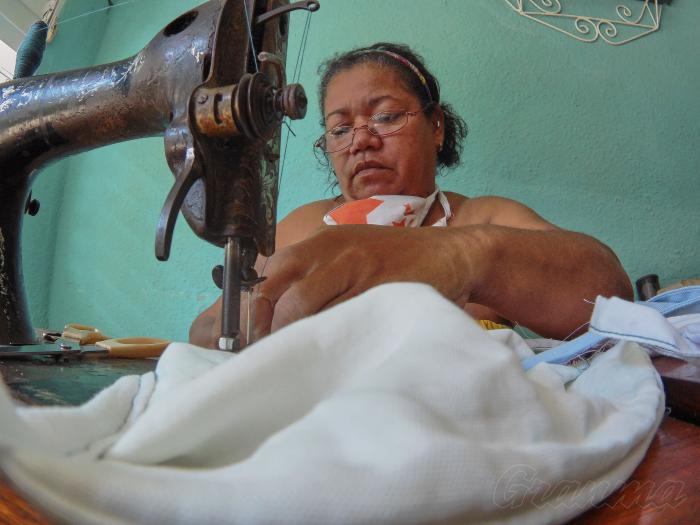
You must be logged in to post a comment.